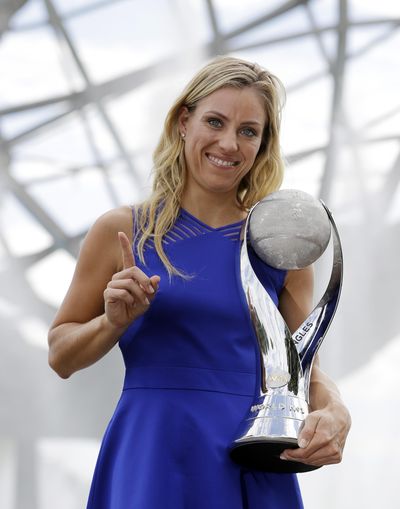U.S. Open champ Angelique Kerber starting to like sound of No. 1 ranking

NEW YORK – About to contest her third Grand Slam final of the year, Angelique Kerber couldn’t help but hear the part of player introductions when she was announced to the crowd as soon-to-be No. 1 in the rankings.
“It still sounds a little bit crazy,” Kerber said a few hours later, the U.S. Open trophy by her side.
Yet it’s also starting to feel real, she added. And deserved.
Especially after Kerber rallied from down a break in the third set Saturday to edge Karolina Pliskova and clinch her second major title of 2016.
The Australian Open back in January was where Kerber not only made her first Grand Slam final but won her first championship. But this U.S. Open may prove to be where the 28-year-old Kerber started to find herself comfortable with all those accolades.
That it would happen at Flushing Meadows is fitting. She’ll always remember the 2011 U.S. Open as “the turnaround” of her career.
She came into the tournament ranked 92nd, never having advanced past the third around at a major. That season, Kerber had lost her opening match at five straight events during one stretch and 10 times overall – including the year’s first three Grand Slams.
“I was just telling myself, ‘OK, just win a few rounds, and then you can get main draw in Australia,’” she recalled.
Instead, she reached the semifinals, where she fell in three sets to eventual champion Sam Stosur. Kerber embraced the big stadiums, the boisterous crowds, the notion she belonged on those stages.
“It started growing,” she said, a smile spreading across her face, “and now I am here as the champion.”
Not that everything went smoothly those five years in between. Kerber made another semifinal at Wimbledon the following summer then didn’t get back that far at a Grand Slam until this year’s Australian Open.
And that run in Melbourne almost never happened. Kerber was on the verge of being swept out of the tournament in straight sets in the first round against 64th-ranked Misaki Doi.
Kerber still remembers how she saved the match point – with a serve out wide that forced Doi to miss a forehand.
“After that, everything starts this year,” Kerber said. “That was a really special match.”
She went on to stun Serena Williams in the final, though that achievement wasn’t easy to handle at first. In her next major, Kerber lost in the first round to 58th-ranked Kiki Bertens at the French Open.
“I had so much pressure on my shoulders,” Kerber said. “I told myself, ‘OK, I will try to enjoy it now.’ And not going out there with the pressure, with the expectations that everybody say, ‘OK, now you have to win every tournament.’”
She made another final at Wimbledon, playing well but losing the rematch with Williams because, as Kerber put it, “Serena was the better player on this day.”
She lost the Olympic gold-medal match to 34th-ranked Monica Puig then fell to Pliskova in the Cincinnati final when a victory would have clinched the No. 1 ranking.
Kerber spent two weeks at Flushing Meadows listening to – and trying to block out – questions about another opportunity to overtake Williams for the top spot.
In the end, when Pliskova upset Williams in the semifinals, Kerber was guaranteed to be No. 1 when the next rankings come out Monday.
She felt a sense of calm going into Saturday’s title match unlike her experiences at the Australian Open or Wimbledon. She explained that her confidence came from knowing exactly what will happen after the final, win or lose, so she could just go out there and play.
Afterward, Kerber thought back to her greatest weakness when she was a teenager aspiring to Grand Slam titles and No. 1 rankings: “My fitness was the worst,” she said, laughing.
She faded in three-set matches. Wilted in the heat. Moved sluggishly around the court.
No one watching her Saturday could have ever imagined that. There was Kerber running down every shot, looking fresh in a decisive set played in stifling humidity.
“Ten years later,” Kerber said, “my fitness is the best, and I can move forever on court.”